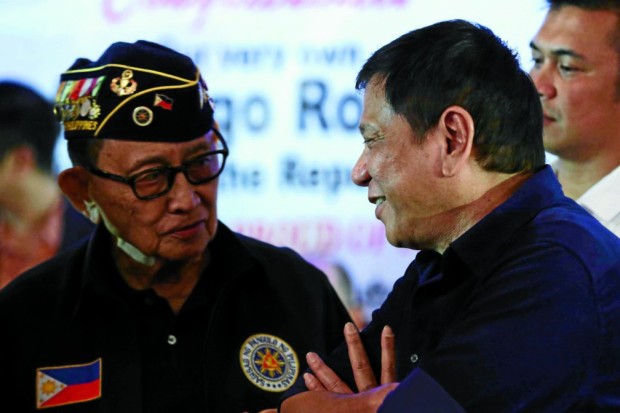
President Rodrigo Duterte and former president Fidel V. Ramos have a private talk in this July 14, 2016 file photo (KING RODRIGUEZ/ PPD)
MANILA — Malacañang has downplayed as “fatherly” advice comments by former President Fidel V. Ramos that President Duterte’s performance in the first 100 days was a “huge disappointment and a letdown to many of us.”
Presidential spokesperson Ernesto Abella said on Monday, at a press conference that “former President Ramos is a senior statesman and he’s acting in a sense like a father.”
In a column in another newspaper on Sunday, Ramos said the government was “losing badly” by prioritizing a controversial war on drugs at the expense of issues like poverty, living costs, foreign investment and jobs.
Ramos said Mr. Duterte could have done a lot of things “had he hit the ground running instead of being stuck in unending controversies about extrajudicial killings of drug suspects and in his ability to use cuss words and insults instead of civilized language.”
Mr. Duterte picked Ramos, who was in office from 1992 to 1998, as his special envoy to break the ice with China and manage the fallout from an international arbitration ruling Manila won in July that dented Beijing’s claims to jurisdiction over most of the South China Sea.
The President has spoken often of his respect for Ramos and that the latter had persuaded him to run in the May presidential election.
Abella noted that Ramos’ criticisms were mainly focused on the President’s words and not on his policy reforms.
“He’s not referring to the actual actions. He’s referring to the public relations, foreign relations that tend to be affected by the President’s language,” the presidential spokesperson said.
Ramos said the administration’s mixed statements on Philippine-US relations were “discombobulating,” including Mr. Duterte’s verbal attack on US President Barack Obama early in September at the same time his defense and finance secretaries were on visits to the United States.
The President a week ago said that Obama should “go to hell” and that in his time, he might “break up” with traditional ally Washington.
On Friday, he reiterated ongoing US-Philippines military exercises would be “the last” and challenged Washington to use the Central Intelligence Agency to oust him.
“So what gives?” Ramos asked.
“Are we throwing away decades of military partnership, tactical proficiency, compatible weaponry, predictable logistics and soldier-to-soldier camaraderie, just like that? On Du30’s say-so?” Ramos said, referring to a popular acronym for Duterte.
He hoped the next 100 days would be “much, much better” and the President would consider “the entire gamut of Philippine problems, starting with poverty.”
Abella said the concerns raised by Ramos as a senior statesman, especially on deteriorating foreign relations, were “worth looking into.”
He said that while Malacañang “appreciated” where Ramos was coming from, “we also continue to move on according to the lights of the President.”
Abella, however, could not say if Mr. Duterte would heed Ramos’ advice but added that he was optimistic that the President would react in a “mature” way.
“We understand where each one is coming from. Each one has his own perspective. But the President is his own person. But on the other hand, the President is not just a reader, an actor and a listener. So we can expect that he also has his own decision-making processes and so may respond in a mature way,” he said.
For Abella, the problem is not with the President but with how the media have been unable to appreciate his message, specifically in going tough on illegal drugs and in talking tough on his critics, in the proper context.
“[W]hat the public needs is a better appreciation of the President’s vision for the nation, which is that we come into our own and truly have an independent mindset, independent spirit and that we will truly, fully embrace our being Filipino,” Abella said.
He said the views of Ramos should be balanced with those of former National Security Adviser Jose Almonte, who felt that Mr. Duterte did “exceptionally well” in his first 100 days, particularly in addressing poverty, law and order, and border security. SFM